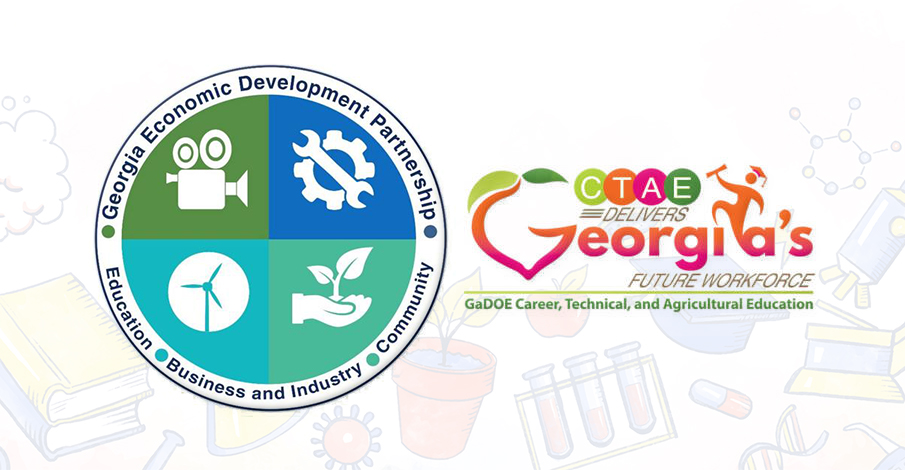
The Georgia Department of Education (GaDOE) and Georgia Department of Economic Development (GDEcD) are partnering to award Why Georgia Works Alignment Grants to help 15 local school districts improve the alignment of their Career, Technical, and Agricultural Education programs with local industry needs.
Through the one-time-only program, GaDOE and GDEcD will award a total of $203,564 in grants to the Clarke, Clayton, Crisp, Effingham, Fulton, Harris, Jackson, Murray, Muscogee, Oconee, Peach, Savannah-Chatham, Tattnall, and White County school districts along with the Marietta City school district. The grants were awarded through a competitive allocation process.
“Preparing the next generation of hardworking Georgians to lead successful careers in all parts of our state is one of our top priorities,” Governor Brian Kemp said. “Building on our priority of creating a state list of high demand career fields, these grants will help schools connect their students with the thousands of opportunities available to them in fast-growing fields.”
Each awarded school district will conduct an in-depth review of local industry needs and work to address gaps between CTAE pathway enrollment and workforce needs. Working with the University of Georgia’s Carl Vinson Institute of Government, the districts will develop and begin implementing an action plan to better connect their CTAE offerings with in-demand, high-wage, and growing industries in Georgia.
“It’s our goal that every student in Georgia will graduate ready for their next step after high school,” State School Superintendent Richard Woods said. “The Why Georgia Works Alignment Grant will help us ensure graduates can pursue fulfilling, high-paying careers without having to leave home – that’s a win for Georgia students and Georgia communities. I appreciate the leadership of Governor Kemp’s office and the partnership of the Georgia Department of Economic Development making this initiative possible.”
With GDEcD’s support, GaDOE’s CTAE office will provide training and implementation support to schools throughout the grant, ensuring they have access to supports, resources, and expertise related to both education and economic development.
“This grant program is another excellent example of the way Georgia pulls together multiple resources to ensure our educational curriculum is consistent with workforce needs, especially at the local level,” GDEcD Commissioner Pat Wilson said. “We want to provide every available opportunity to uplift students, workplaces, and communities, and we know our approach works because we’ve seen it time and again. This is another tool to help keep Georgia residents and industries thriving.”
In the fall of 2023, GaDOE and the Carl Vinson Institute of Government released an updated Georgia Alignment Toolkit to guide schools and districts in connecting education and industry.
This project was sponsored by the U.S. Department of Commerce – Economic Development Administration through Award ED22ATL3070005 as a single-year grant opportunity.
About Career, Technical, and Agricultural Education in Georgia
GaDOE’s Office of Career, Technical, and Agricultural Education works to deliver a K-12 education that prepares students for their lives after high school. Students can learn skills for real-world careers in 144+ Career Pathways while earning recognized industry credentials and participating in hands-on learning opportunities. Georgia’s CTAE Pathway completers continually record graduation rates above 97%.
About the Georgia Department of Economic Development
The Georgia Department of Economic Development (GDEcD) is the state’s sales and marketing arm, the lead agency for attracting new business investment, encouraging the expansion of existing industry, locating new markets for Georgia products, attracting tourists to Georgia, and promoting the state as a location for arts, film, and digital entertainment projects, as well as planning and mobilizing state resources for economic development.


Chattooga Local News
AllOnGeorgia Launches Reader Poll for March 10 Special Election

Chattooga Local News
Trump Announces Plan to Release Government Files on UFOs and Extraterrestrial Life 👽

Chattooga Local News
Rome Native Returns with Thunderbirds in April

Bulloch Public Safety
02/19/2026 Booking Report for Bulloch County

Bulloch Local News
Georgia DOT: Statesboro – Road closure scheduled on bypass

Bulloch Public Safety
01/26/2026 Booking Report for Bulloch County

Bulloch Public Safety
02/09/2026 Booking Report for Bulloch County

Bulloch Public Safety
01/22/2026 Booking Report for Bulloch County

Bulloch Public Safety
02/16/2026 Booking Report for Bulloch County

Bulloch Public Safety
02/02/2026 Booking Report for Bulloch County




